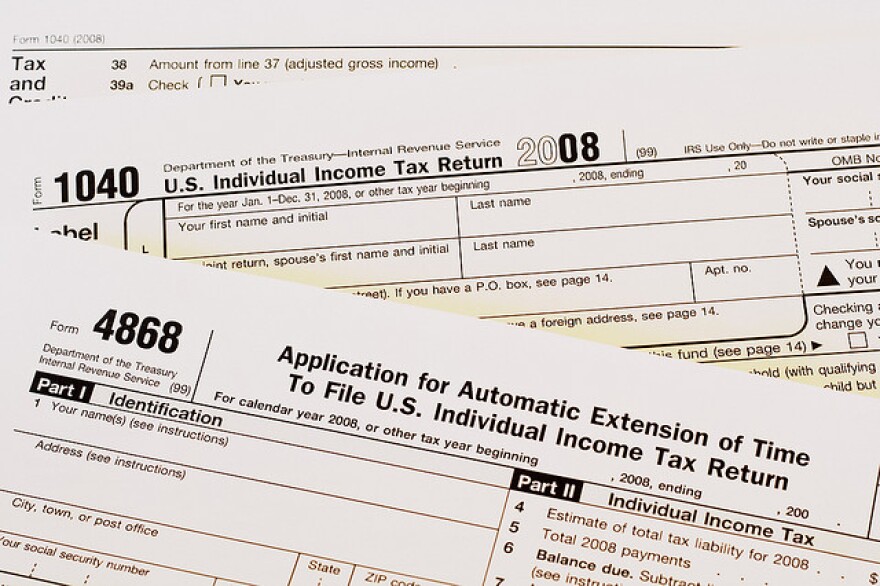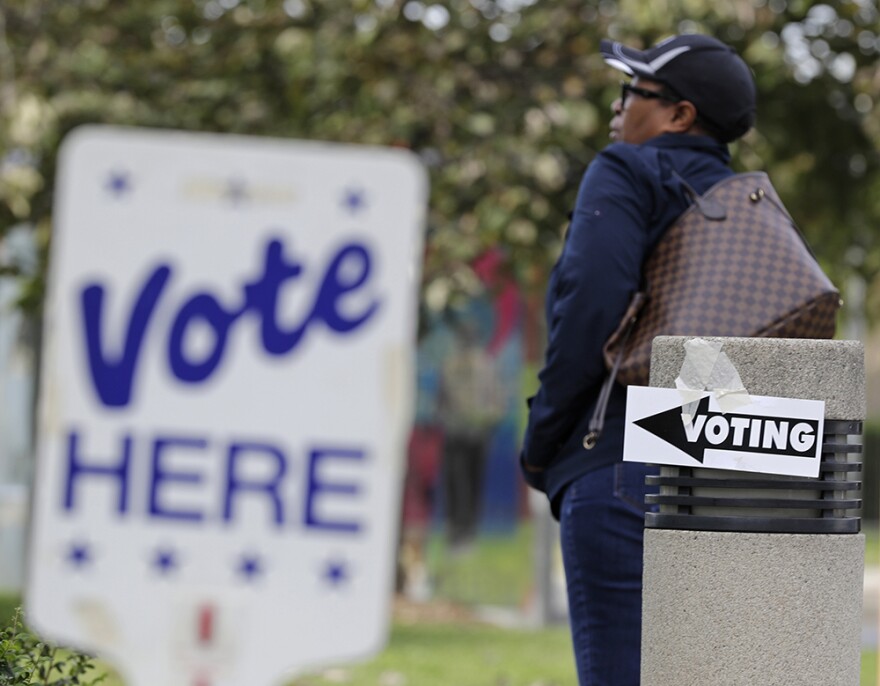With Election Day just around the corner, ąĎÉńapp is highlighting and explaining each of six proposed constitutional amendments that will appear on the ballot.
Question #1: Right to Hunt and Fish
Chad Morgan grew up in Brevard, North Carolina, going hunting with his dad.
Morgan recalled starting out at age 5 with a BB gun, then moving up to a .22, then a .410 shotgun and notching his first kill in the western North Carolina mountains.
"It was a squirrel hunt in Balsam Grove, North Carolina, at the headwaters of the French Broad River," he said.
Morgan described himself as a Blue Dog Democrat but said he always votes his values, regardless of party.
He is now 49 and has taught his three teenage daughters to hunt.
Morgan is an active member of the Wake County Wildlife Club and said he supports the proposed amendment to carve out a state constitutional protection for hunting and fishing, not that these rights are under attack.
"I'm not an attorney and I'm not a law expert but to me, in just my experience over the years, it seems like it's a little bit easier to get a law overturned than a constitutional amendment," he said.
The amendment states: "The right of the people to hunt, fish and harvest wildlife is a valued part of the State's heritage and shall be forever preserved for the public good."
It also says these rights are subject only to laws enacted by the General Assembly.
The measure does nothing to change existing state law.
State Rep. Darren Jackson (D-Wake) said he grew up doing some hunting, too.
"Hunting deer and rabbits on a lot of our game land in the state, down in Belhaven, in Bladen County," said Jackson, who leads the Democrats in the North Carolina House of Representatives.
Jackson said fishing and hunting are alive and well in North Carolina and he sees the amendment as nothing more than a political ploy by the General Assembly's Republican leadership.
"I think that is just a throwaway amendment that really is not going to change our statutory framework in any significant way," Jackson said.
Jackson claimed the measure is just a distraction from what he calls more dangerous amendments on the ballot, like the photo ID requirement for voters, as well as a way to draw conservative voters to the polls.
Chad Morgan, who supports the amendment, does not disagree with Jackson.
"It'll definitely get some of the hunters out and hunters typically are a little more conservative," Morgan said, though he said he believes the amendment will help efforts to promote and educate people about hunting, fishing and conservation.
Question #2: Expanding Victims' Rights

Colon Willoughby served as Wake County District Attorney for the better part of three decades.
In the 1990s, he advocated for expanding crime victims’ rights, helping in the effort to draft the current victims’ rights amendment in the state constitution.
"You can't prosecute many of the cases without having the involvement of the victim to show that the person broke into their house, or stole their property or assaulted them," Willoughby said.
Now as an attorney with the Raleigh law firm McGuireWoods, Willoughby has done paid consulting work and lobbying for a group supporting Marsy's Law, the victims’ rights legislation passed in California and named for a slain woman, Marsy Nicholas. There is a nationwide effort to persuade other states to adopt such laws.
"We've done a really good job in our society of providing defendants' rights and protecting them with the constitution and ensuring that they were provided those rights but need victims' rights on parity with the defendants' rights," said Willoughby.
The state constitution victims of crimes the right to be notified of court proceedings and to be heard at sentencing.
The proposed amendment would give victims the right to be heard at any court proceeding in their case and to receive restitution in a timely manner, and it would guarantee enforcement of their rights.
But not all prosecutors think a constitutional amendment is the way to go.
"I'm concerned that it may stretch thin the resources for the victims of personal crimes, you know, like homicide and sexual assault," said Peg Dorer, who directs the North Carolina Conference of District Attorneys.
Dorer said that's because of the huge number of property crimes and victims in those cases that will need expanded attention from overtaxed district attorney offices.
She also said the right to enforcement of victims’ rights could mean additional hearings and ballooning court dockets.
Question #3: Cap on Personal & Corporate Income Tax

Let's get one thing straight, this is not a proposed tax cut.
North Carolina's personal income tax rate is already well below the ceiling set by the , and it's scheduled to drop to 5.25 percent next year.
The constitution already says that the state's personal and corporate income tax may not exceed 10 percent.
This amendment would lower that ceiling to seven percent.
The distinction between a proposed tax cut and a cap on the income tax is important.
An last month showed that when simply asked whether they were for or against the change, 56 percent of registered voters supported the measure.
But when given a fuller explanation, support dropped to 45 percent and the number of respondents against the amendment spiked.
"It does suggest that lots of folks are saying, 'You know, I'm not as for this,'” said Elon poll director Jason Husser. “And so the folks against went from 15 percent to 27 percent, so we see almost doubling of the opposition."
The tax cap issue comes down to competing philosophies.
NC State University Economics Professor Mike Walden said Republicans who control the state legislature generally believe in less government spending and a more private-sector driven economy.
"So they've been trying to do things to encourage private sector investment and the state business investment, they think this is part of that,” explained Walden.
And Walden said GOP leaders hope to send a message by lowering the cap.
"We are not going to be a state that's going to overtax you and we are so committed to that that we've actually put in the constitution limits on, in this case, the income tax rate,’" Walden said.
Democrats on the other hand, Walden said, are guided by a belief in a more active government.
"To fund schools, to fund higher education, to fund various kinds of programs that help people who are at the bottom of the economic ladder move up," he said.
Opponents of the amendment also argue the lowered cap could put the state in a serious bind when a recession occurs, perhaps forcing a hike in fees or sales or property taxes.
Question # 4: Proposed Photo ID Requirement

Republicans in the North Carolina General Assembly have pushed voter ID legislation before--with pretty dismal results.
"The last time North Carolina had a voter ID requirement for voters it was one of the strictest in the nation and was overturned by the Fourth Circuit Court of Appeals," said Tomas Lopez, executive director of Democracy North Carolina.
The was struck down for targeting African-American voters with "almost surgical precision." That ruling came from an activist liberal judge, according to Representative David Lewis, a Harnett County Republican.
"He said that despite the fact that participation was up, that despite the fact that we gave free IDs and educated people for two years in advance, that our heart was in the wrong place, that we had discriminatory intent," Lewis said.
Multiple polls in recent years have shown strong support for Voter ID.
"I think that people have some risk calculus that goes on in their head, that yes, this may inconvenience a few people but they see that it's important for the integrity of the elections and they're just willing to accept it or an alternative theory is they just haven't really thought too much about those inconsistencies in it," said Jason Husser, who directed one of those polls for Elon University in September.
Opponents say the amendment addresses a problem that doesn't really exist.
A of the 2016 elections found .01 percent of the ballots were cast by ineligible voters. Most of those were unknowingly cast by convicted felons. Two were cases of fraud--someone casting a vote for a deceased relative.
Supporters point to the that have voter ID laws. But not all are created equally. Some do not require photos, others allow people without photos to vote after signing an affidavit. And only two -Mississippi and Arkansas--have ID requirements in their constitutions.
It's not clear how North Carolina would enforce a photo ID requirement. If the amendment passes, legislation to address specifics will come later--perhaps in a late November lame-duck session after the midterms, before a new General Assembly convenes.
Question #5: Judicial Vacancies

The gives the governor the power to fill judicial vacancies.
Typically, the governor selects from a slate of candidates elected by the local bar association - but is not obligated to choose from that group.
The appointee holds the seat until the next election for General Assembly that is more than 60 days after the vacancy is filled.
But Republican legislators like State Representative David Lewis say the amendment would create a better system.
"A system that considers merit, that, again, has input from all three branches of government. And, again, this is only to fill judicial vacancies," said Lewis, a member of the General Assembly's GOP leadership.
The amendment would create a purportedly non-partisan judicial merit commission consisting of nine members.
The governor, General Assembly and Chief Justice each would select three members.
The commission would present a list of qualified nominees to the General Assembly.
The governor then would get to choose from nominees recommended by the General Assembly, including at least two from the list advanced by the merit commission.
Lewis maintains this process is less political.
"Well that, of course, is baloney,” said former North Carolina Governor Jim Martin. “The General Assembly is always partisan regardless of which party has a majority, whether it's Democrats or Republican. They're gonna do what they want to do."
Martin, a Republican, like Lewis, served two terms as governor from 1985 to 1993.
He and the four other living ex-North Carolina governors crossed party lines to speak out against this amendment.
Martin, Republican Pat McCrory, and Democrats Jim Hunt, Mike Easley, and Bev Perdue all say the proposed amendment is an attack on the separation of powers.
"The principle is that you don't put all power in the courts or in the legislature or in the executive branch,” said Martin.
Martin and the other ex-governors say the amendment is no more than a legislative power grab.
Question #6: Altering the State Board of Ethics & Elections Enforcement

The Board of Elections and Ethics Enforcement has been a focal point of the power struggle between the Republican-led General Assembly and Governor Roy Cooper, a Democrat.
"Last year, Governor Cooper asserted in a lawsuit against the General Assembly that the board of elections was, in fact, purely under his control," said state Rep. David Lewis (R-Harnett), a member of the legislature’s GOP leadership.
But the state Supreme Court agreed with the governor's argument that lawmakers violated his constitutional authority and forced the legislature to re-write the law.
Now the board has nine members total, four Republicans and four Democrats. All were appointed by the governor from a list of nominees submitted by each of the State party chairs.
The crucial ninth member is not affiliated with either of the major parties. The governor selects that member from a list of two nominees picked by the other eight board members.
A recent Superior Court ruling said this latest re-write of the law is also unconstitutional.
But Republicans in the legislature remain determined to seize control of the board's makeup.
Defending the proposed amendment, Lewis said GOP lawmakers just want elections and ethics laws administered in a fair way.
"The model that's contemplated would have input from the leader of the largest political party and the second largest political party in both the house and the senate," Lewis said.
The amendment would reduce the number of board members from nine to eight.
The governor would be required to select appointees from lists submitted by legislative leaders from both parties.
"This is being changed only for one reason and that's because Roy Cooper was elected governor and so the Republicans want to take that power away from him," said state Representative Darren Jackson, who leads the House Democrats.
"And the way this is, you're just totally leaving out unaffiliated voters, you're also leaving out Constitutional Party, Libertarians, Greens," Jackson added.
Critics of the proposed amendment say it's a recipe for deadlock.
Lewis, the Republican, said building consensus is vital with something as important as ethics and elections law.
The amendment has created a consensus among North Carolina's five living ex-governors. Republicans Jim Martin and Pat McCrory, and Democrats Jim Hunt, Mike Easley, and Bev Perdue, have joined forces to oppose the amendment.








